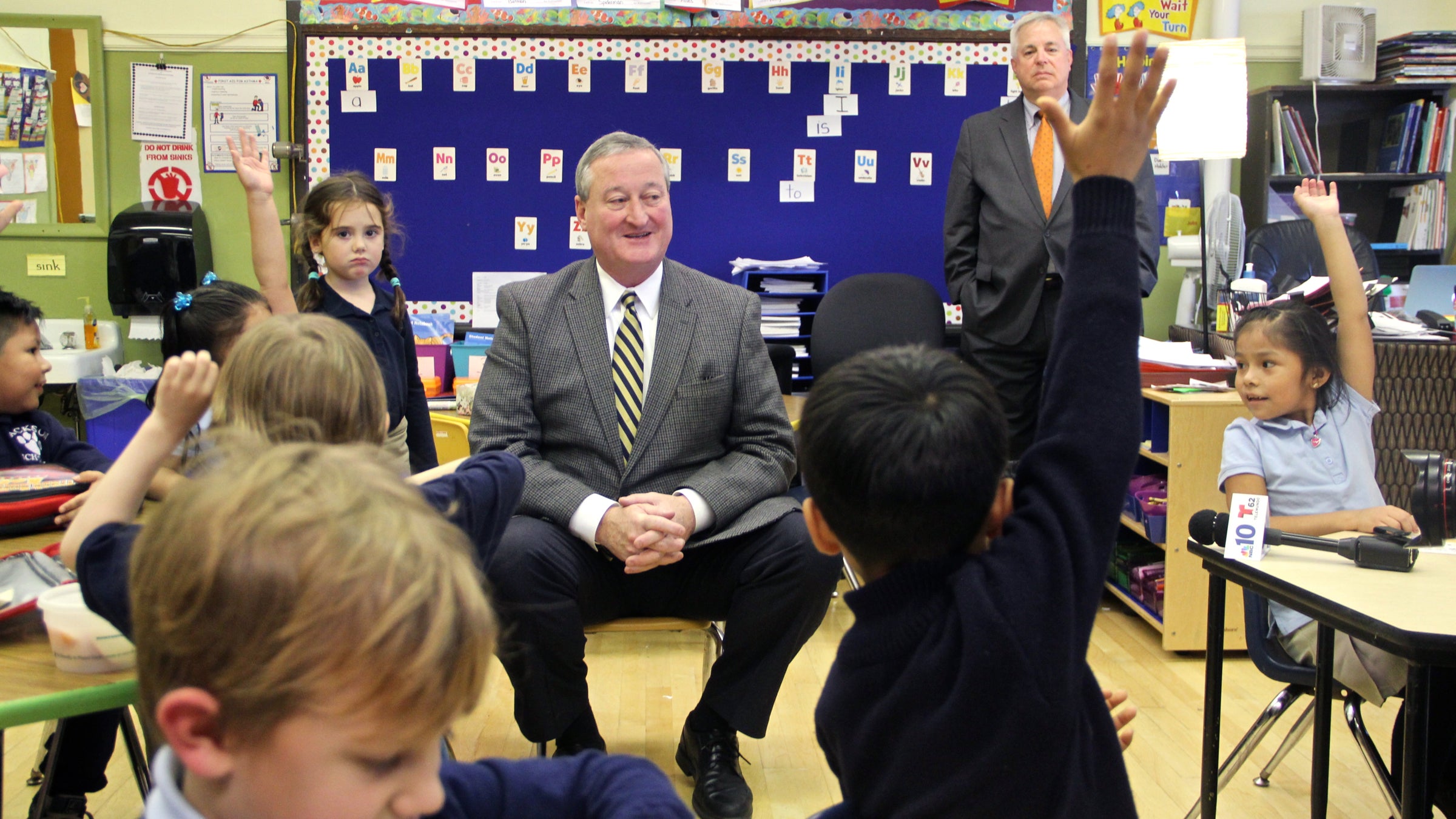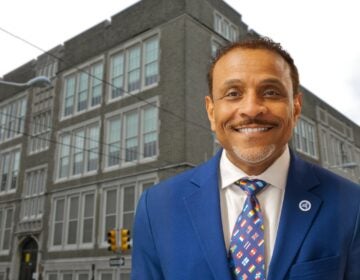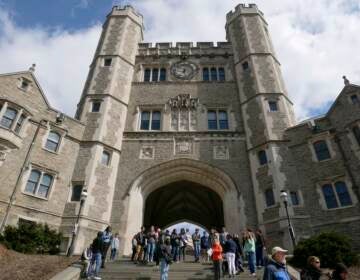Kenney’s inaugural fundraiser for Philly schools: where’s the money going?

Jim Kenney, pictured during a visit to Andrew Jackson Elementary School in South Philly, will use his inaugural party to raise money for The Fund for the School District of Philadelphia. (Emma Lee/WHYY)
Seven hours after he’s sworn in as Philadelphia’s 99th mayor, Jim Kenney will attend a private fundraiser for the Fund for the School District of Philadelphia.
The minimum donation: $5,000.
During the event at the Pennsylvania Convention Center, Kenney will thank major donors such as the city’s carpenter’s union, which sent $100,000 to the fund in honor of his inauguration (but won’t attend because the union is locked in a battle with the convention center). Later, attendees of his inaugural block party will be encouraged to give what they can to the nonprofit, with no minimum.
The fund’s president and CEO Donna Frisby-Greenwood said Kenney approached her in June, one month after winning the Democratic primary, about ways to tap the private sector to make up for a lack of state aid.
“The public-private partnership is extremely important to educating our children,” she said.
Frisby-Greenwood was hired in May to usher in a rebranding of the fund, which was established in 2003 under the name “Philadelphia’s Children First Fund.” It has served as the nonprofit arm of the city’s school district.
“Clearly the cuts to education over the last decade or more have created a situation where schools are not able to provide music and art, after school programs, a teacher, librarians, counselors,” said Kenney.
Those are the things he hopes the newly-renamed Fund for the School District of Philadelphia will be able to bring back to schools across the city. It’s where Kenney plans to send revenue from leasing city-owned luxury boxes at Philadelphia’s sports complexes and major concert venues — a campaign promise.
Buyout controversy raises transparency questions
In 2011, the fund came under scrutiny when it was used to solicit private donations to support the nearly $1 million buyout of former schools superintendent Arlene Ackerman. She and the district were parting ways just three years into her controversial tenure and she was guaranteed years of income. Government watchdog groups and former state Auditor General Jack Wagner pressured the fund to reveal the names of donors.
Ultimately, the school district picked up the full tab for Ackerman’s buyout, but the incident left some education advocates with a bad taste in their mouths.
Retired teacher Lisa Haver, said she is skeptical of using private donors to fund public schools because of the lack of transparency.
“I would like to know where the money’s coming from and where the money is going to, but at the end of the day, it’s not a public fund and their board is not made up of people I can vote for,” she said.
Haver, a Kenney supporter, said she hopes his efforts raising charitable donations for Philadelphia education on Inauguration Day will not “take away the impetus from politicians to fund schools.”
Kenney insists that will not be the case and while he won’t direct how the money is spent, he envisions the fund being a resource for teachers and principals with special projects in mind for their students.
“I trust these folks and know where they stand on the issues and trust them for raising money for them,” he said of the fund’s board and staff.
Fund gets new name, new goals
In the years after the Ackerman controversy, the fund continued to operate out of the spotlight with just one paid employee. The nonprofit’s 2014 federal tax filings, the most recent available, showed it gave out about $930,000 in grants and had just over $3 million in net assets.
Sometime in 2014, the fund got a new name and a new website.
Last year, Frisby-Greenwood left a post at the Knight Foundation to become the Fund for the School District of Philadelphia’s first president and CEO. The fund has also hired a finance director and manager for special projects.
The board is made up of some of Philadelphia’s wealthiest philanthropists, business executives, former and current School Reform Commission members, an award-winning high school principal, and people with ties to other major foundations.
Frisby-Greenwood said the fund is committed to transparency and posts the names of major donors and the group’s own tax filings on its website.
To those who are skeptical of the role of philanthropy in education, she says “the kind of dollars that come in from the private sector will never equal the kind of dollars we as taxpayers put into public education.”
Where private dollars can help the most is funding small-scale projects that make a large impact, Frisby-Greenwood said. She meets regularly with Superintendent William Hite to make sure the money that doesn’t already come with specific instructions from donors goes toward the district’s priorities.
The fund is raising $3.5 million for an initiative called the “Right Books Campaign,” which would put a curated mini-library in every elementary school classroom. The goal is to get all Philadelphia students reading at or above grade level by the time they’re eight years old. This would put age-appropriate books into children’s hands.
The board hopes to raise $5 million a year for the next five fiscal years and is expected to get a bump in support from Kenney’s inaugural celebrations.
“We are really excited the mayor-elect Kenney sees education as his number one priority for our city,” said Frisby-Greenwood.
WHYY is your source for fact-based, in-depth journalism and information. As a nonprofit organization, we rely on financial support from readers like you. Please give today.




